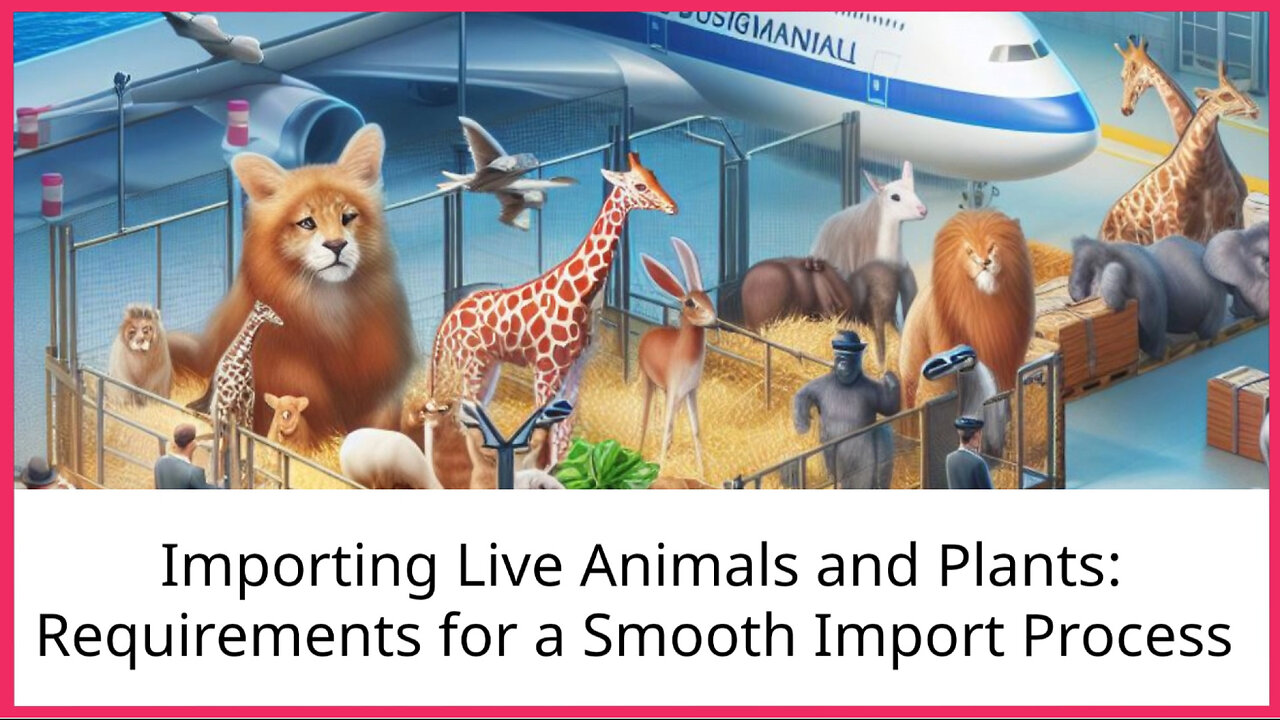Premium Only Content

Navigating the Complexity: Importing Live Animals and Plants
ISF Template | 562-453-7357 | isf@isftemplate.com | www.isftemplate.com
Importing live animals and plants requires careful adherence to regulations to safeguard the environment, agriculture, and public health. Customs brokers play a crucial role in assisting importers to comply with these requirements. The import process begins with the submission of an Importer Security Filing (ISF), providing essential information about the shipment. It must be submitted at least 24 hours before the vessel's departure from the port of loading. Failure to comply with ISF requirements can lead to penalties and clearance delays. Importers may also need to obtain a customs bond as a financial guarantee for compliance and payment of duties, taxes, and fees. The bond amount varies based on the type and value of the goods. Additionally, permits and licenses specific to the importation of live animals and plants must be obtained. These permits ensure compliance with health, safety, and quality standards and are issued by relevant governmental agencies. Upon arrival at the port of entry, live animals and plants may undergo quarantine and inspection to verify compliance and mitigate the risk of pests, diseases, or invasive species. Accurate documentation, including invoices, packing lists, and phytosanitary certificates, is essential throughout the import process for compliance, auditing, and traceability purposes. Customs brokers can assist importers in organizing and maintaining these documents for smooth customs clearance.
#usimportbond #isfcustomsbroker #uscustomsclearing #isfentry
Video Disclaimer Here: This video is designed for education and is unaffiliated with US government bodies.
-
 17:13
17:13
Degenerate Jay
4 hours agoWB Games Is Falling Apart
3.56K2 -
 9:07
9:07
Bearing
7 hours agoElon Causes a Stir 🤣
3.98K20 -
 8:41
8:41
BIG NEM
20 hours agoMeet Tommy: He's a 40 Year Virgin
1.95K1 -
![EP. 151 - Become a Paid "Citizen Journalist" [your]NEWS - Meet Sam Anthony](https://1a-1791.com/video/fwe2/68/s8/1/T/E/Z/5/TEZ5w.0kob.2-small-Live-with-Restream-January-.jpg) 1:09:02
1:09:02
Kat Espinda
1 day agoEP. 151 - Become a Paid "Citizen Journalist" [your]NEWS - Meet Sam Anthony
1.98K6 -
 1:00:21
1:00:21
Trumpet Daily
1 day ago $4.16 earnedWhy Do Migrant Criminals Love Obama So Much? - Trumpet Daily | Jan. 24, 2025
4.53K20 -
 55:39
55:39
PMG
19 hours ago $0.18 earnedDeep Sea Diver Explains Titanic and Space Shuttle Recovery Missions w/ Curt Newport
1.75K1 -
 2:02:29
2:02:29
Wahzdee
6 hours agoIs It Too Late to Git Gud at Warzone? 🎮🔥 - Early Morning Solos! S1E3
80.4K1 -
 2:04:36
2:04:36
I_Came_With_Fire_Podcast
14 hours agoCartels vs. America: Fentanyl's 2 Front Attack, and the Rise of CJNG
19.6K8 -
 2:50:03
2:50:03
BlackDiamondGunsandGear
18 hours agoLIVE SHOW / CMMG/ DLD AFTER DARK
28.9K1 -
 52:05
52:05
PMG
19 hours ago $7.44 earnedWhat Does Freedom Cost? Steven Solomon's On-the-Ground Documentary in Ukraine
63.8K9